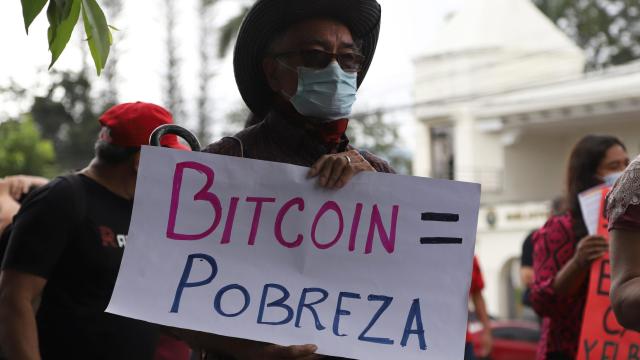The government of El Salvador purchased at least 200 bitcoin recently, ahead of the country officially recognising bitcoin as a form of legal currency on Tuesday. The purchase brings the government’s total holdings to at least 400, the equivalent of roughly $US20.5 ($28) million in crypto based on this morning’s price.
“El Salvador just bought 200 new coins,” President Nayib Bukele tweeted on Monday night. “We now hold 400 #bitcoin #bitcoinday”
Bukele, a 40-year-old aligned with the political right wing, championed a law back in June to officially recognise bitcoin as a national currency. The law going into effect today, meaning people will be able to pay their taxes with bitcoin, and perhaps most importantly, avoid capital gains taxes on bitcoin in the country.
The government has even incentivised the adoption of bitcoin within El Salvador with the country’s official crypto wallet, known as Chivo. Citizens can sign up and receive $US30 ($40) in free bitcoin, though privacy advocates are concerned about the app. Bukele has reassured nervous Salvadorans that all wages and pensions from the government will still be paid in U.S. currency, which El Salvador adopted in 2001 after its national currency crashed, and not in bitcoin.
El Salvador is the first country in the world to recognise bitcoin as a currency, and other countries are sure to be watching closely to see how well it goes. The Bitcoin Law is being heralded by crypto enthusiasts as a new chapter in the world of money and will supposedly help the roughly 70% of Salvadorans who don’t have access to traditional financial services. But bitcoin has shown little use outside of its function as a speculative asset — an elaborate Ponzi scheme that funnels money from the poor to those who are already wealthy.
Bitcoin’s price is extremely volatile, which makes its use as a currency incredibly difficult. When El Salvador passed the Bitcoin Law back in early June, the price was $US31,453 ($42,298). This morning, the price is $US51,423 ($69,154). And while that’s great for people who purchased bitcoin back in June, it’s just as likely to crash back to that level on a moment’s notice.
One of the biggest hurdles for bitcoin right now is its technological limitations and inability to scale. The bitcoin blockchain can only handle about 7 transactions per second at its best. By comparison, Visa says it can handle about 24,000 transactions per second. Bitcoin boosters love to brag about the crypto as a shiny new technology, but it’s actually not very good at the one thing it’s celebrated as: a currency.
There’s also bitcoin’s relatively high transaction costs, which currently average about $US3.30 ($4). As recently as April, transaction fees for bitcoin were over $US60 ($81), which, again, makes it incredibly impractical as a currency.
Since it was announced, the Bitcoin Law has already caused the ratings agency Moody’s to downgrade El Salvador and the IMF is worried about a new loan it’s negotiating with the country. And regulators around the world are worried that El Salvador’s embrace of bitcoin will lead to a rush of money launderers into the country.
Will El Salvador succeed in becoming a bitcoin-based economy, despite the tremendous problems baked into the crypto’s technology? That remains to be seen. But one thing’s for sure: If you love to launder money, El Salvador is your new favourite place in the world.
